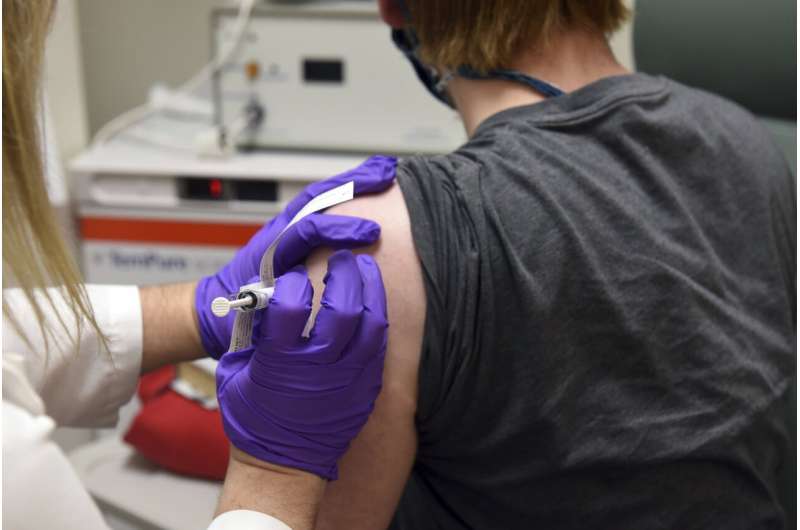This May 4, 2020, file photo provided by the University of Maryland School of Medicine, shows the first patient enrolled in Pfizer's COVID-19 coronavirus vaccine clinical trial at the University of Maryland School of Medicine in Baltimore. The German pharmaceutical company BioNTech and its U.S. partner Pfizer say they have submitted an application for conditional approval of their coronavirus vaccine with the European Medicines Agency. (Courtesy of University of Maryland School of Medicine via AP, File)
The German pharmaceutical company BioNTech and its U.S. partner Pfizer say they have submitted an application for conditional approval of their coronavirus vaccine with the European Medicines Agency.
The two companies said Tuesday that the submission, which occurred Monday, completes the rolling review process they initiated with the agency on Oct. 6.
The move comes a day after rival Moderna said it was asking U.S. and European regulators to allow emergency use of its COVID-19 vaccine.
BioNTech said if the vaccine, currently named BNT162b2, is approved, its use in Europe could begin before the end of 2020.
The companies said last month that clinical trials with tens of thousands of participants showed the vaccine had an efficacy rate of 95%. The success rate in particularly vulnerable older age groups was more than 94%, they said.
BioNTech and Pfizer have already submitted a request for emergency approval with the U.S. Food and Drug Administration and the U.K. regulator MHRA, as well as rolling submissions in other countries including in Australia, Canada and Japan.
"We have known since the beginning of this journey that patients are waiting, and we stand ready to ship COVID-19 vaccine doses as soon as potential authorizations will allow us," Pfizer's chief executive Albert Bourla said in a statement.
Germany's science minister said Tuesday that the same safety standards are being applied in the approval process for coronavirus vaccines as for other drugs and that this would be key to gaining the widest possible public acceptance for COVID immunization.
Anja Karliczek told reporters in Berlin that the EMA will be holding a public hearing on Dec. 11 on the approval request by BioNTech and Pfizer.
She added that the vaccine will be voluntary and that authorities will work hard to inform the public about possible side effects that might be expected after immunization, such as headaches, localized pain and fever.
Marylyn Addo, a doctor at Hamburg's UKE hospital who is involved in the trials for a rival vaccine, said the rapid development of a vaccine was the result of enormous efforts by scientists, early funding and experience from previous vaccines.
© 2020 The Associated Press. All rights reserved. This material may not be published, broadcast, rewritten or redistributed without permission.
























